May 20, 2025 | 13:24 GMT +7
May 20, 2025 | 13:24 GMT +7
Hotline: 0913.378.918
May 20, 2025 | 13:24 GMT +7
Hotline: 0913.378.918
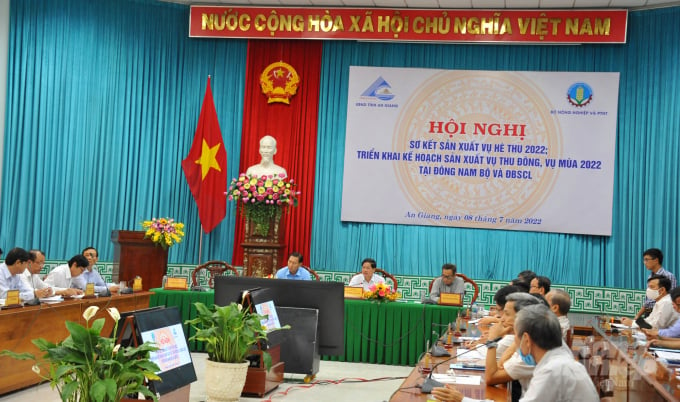
The Ministry of Agriculture and Rural Development coordinated with the People's Committee of An Giang province to organize a conference to review the production of the summer-autumn crop 2022 and implement the production plan for the upcoming autumn-winter and winter crops in the southern region Photo: Le Hoang Vu.
A conference to review the production of the summer-autumn crop 2022 and implement the production plan for the upcoming autumn-winter and winter crops in the southern region was held last weekend in Long Xuyen City in the southern province of An Giang.
The event was organized by the Ministry of Agriculture and Rural Development (MARD) in collaboration with the People's Committee of An Giang Province. It was chaired by the Deputy Minister of Agriculture and Rural Development Le Quoc Doanh.
According to Le Thanh Tung, Deputy Director of the Department of Crop Production under the MARD, the whole southern region sowed 1,575 million hectares of rice in the summer-autumn crop of 2022, a decrease of 20,000 hectares compared to the previous summer-autumn crop. In which, the Mekong Delta region sowed nearly 1.5 million hectares, down 156,000 hectares, while the southeast region sowed 82,000 ha, down 3,600 ha. Up to now, the whole Mekong Delta has harvested over 400,000 ha of summer-autumn rice in the total of 1.5 million ha, earning an average yield of 6-6.5 tons/ha.
Via such data, Tung emphasized that the summer-autumn rice crop in the Mekong Delta was considered a complete victory, suffered from few pests and diseases, and profitable in the context of rising prices of fertilizers, pesticides, gasoline and oil.
He also cited one successful example which is Hau Giang Province. The local farmers have reduced the amount of fertilizer by more than 30 per cent, but the yield has increased by 10 per cent compared to last year's summer-autumn crop.
This result was achieved thanks to changing farming practices and timely application of advanced technical advances in the context of “price storm” such as IPM, "Three Reductions, Three Gains " and "1 Must, 5 Reductions”.
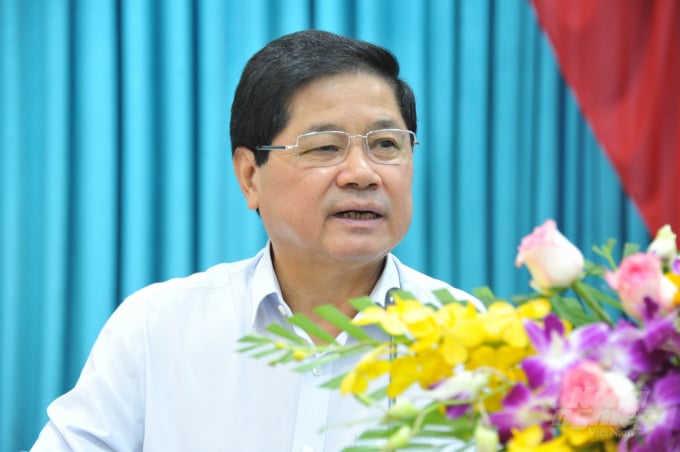
Deputy Minister of Agriculture and Rural Development Le Quoc Doanh spoke at the conference. Photo: Le Hoang Vu.
Speaking of the successes of summer-autumn rice cultivation in the Mekong Delta, Director of the Southern Plant Protection Center Do Van Van said that the rice pests were properly controlled in this year's summer-autumn crop, which is the best news compared to previous crops.
Although over 400,000 hectares of the summer-autumn crop has been harvested and another one million will be harvested till the end of August, diseases of concern might still occur like grain discoloration or rice blast disease. Therefore, the Plant Protection Department recommends that localities take appropriate preventive measures to ensure the full yield of the 2022 summer-autumn rice crop.
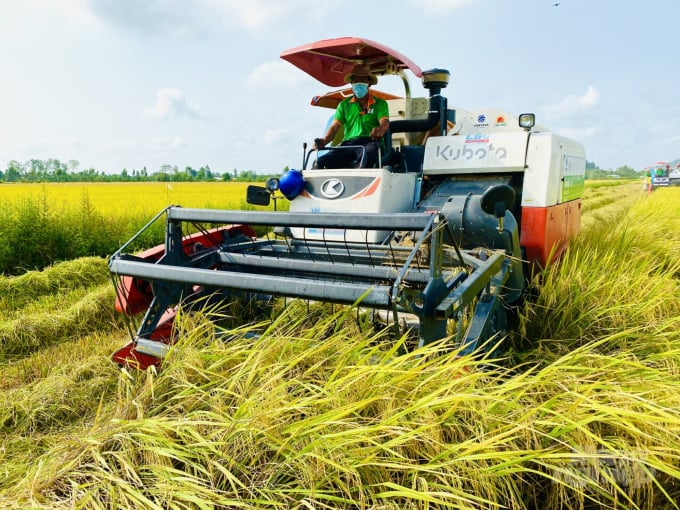
The whole Mekong Delta region has sown nearly 1.5 million hectares of rice in the summer-autumn crop 2022. Over 400,000 hectares has been harvest with an average yield of 6-6.5 tons/ha. Photo: Le Hoang Vu.
Ung Hong Nghi, Deputy Director of Tien Giang Department of Agriculture and Rural Development, said Tien Giang's summer-autumn rice yield was still guaranteed as planned despite high prices of agricultural inputs and influences by many other factors. Specifically, rice yield reaches from 5.9-6.1 tons/ha, producing the output of about 400 thousand tons, over 85% of which is high-quality rice.
To obtain such a result, the provincial agricultural sector has encouraged farmers to apply the farming methods such as reducing fertilizers, pesticides and varieties since the beginning of the crop. With successful results of over 75%, Tien Giang's 2022 summer-autumn rice crop has been considered a complete success so far.
In the autumn-winter crop of 2022, the Mekong Delta is expected to sow 700,000 ha of rice, down 3,500 ha over the same period. The yield is estimated at 57.12 quintals/ha and the output is 4 million tons, up 17,000 tons.
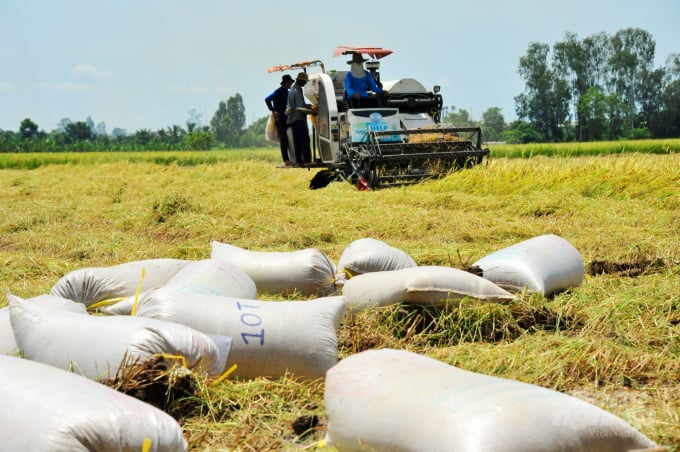
According to the Ministry of Agriculture and Rural Development, the farmers in the southern region still earn profits despite the difficulties they encountered in the 2022 summer-autumn crop. Photo: Le Hoang Vu.
As for the 2022 crop, the whole southern region plans to sow 268,500 hectares of rice, including 172,000 hectares in the Mekong Delta and 96,500 hectares in the southeast, with a total rice production estimated at 1.3 million tons, an increase of 150,000 tons.
Nguyen Si Lam, Director of An Giang Department of Agriculture and Rural Development, said: “An Giang ensures to meet the targets, productivity and output assigned by the MARD. To do this, the local agricultural sector always focuses on encouraging farmers to apply new scientific and technical measures to reduce costs and increase profits, from which they would change from the conventional production mindset to an agricultural economic mindset to meet the needs of businesses and high quality standards for export. Especially in this year's autumn-winter crop, An Giang planted 160,000 hectares, all of which are located in safe flood control dikes to ensure yields.”
The director also revealed good news to glutinous rice growers in An Giang Province: the People's Committee of An Giang province has signed a contract with Loc Troi Group, according to which, high-quality techniques will be adapted to the cultivation of glutinous rice on 50 per cent of growing area in the locality to be exported to Europe.
According to Deputy Minister of Agriculture and Rural Development Le Quoc Doanh, the winter-spring crop of 2022 would not be affected by drought and salinity, summer-autumn rice would not be attacked by pests and diseases and particularly, the Mekong Delta region has been thoroughly invested in irrigation.
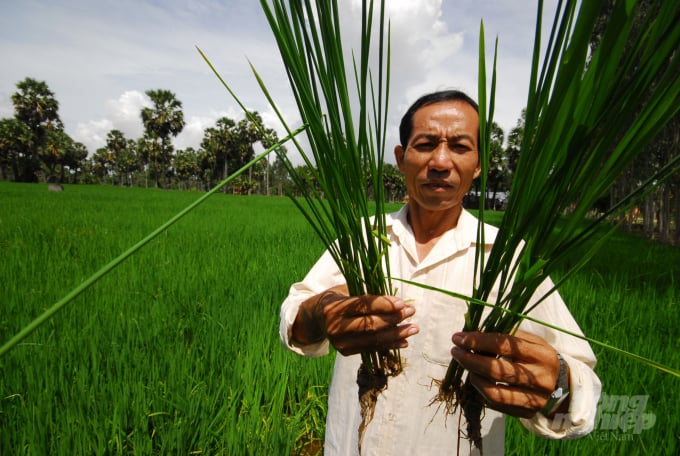
In the autumn-winter season of 2022, farmers in the Mekong Delta region sowed about 700,000 hectares of rice. Photo: Le Hoang Vu.
Additionally, the VnSAT project has supported Mekong Delta farmers with modern cultivation to reduce costs and increase profits.
The Deputy Minister expressed his hope that the summer-autumn rice crop would succeed in the context that all inputs are high.
“To improve the quality of Vietnamese rice, the only way is to apply synchronous mechanization, advanced scientific and technical measures, reduce costs in fertilizers, pesticides and increase the use of organic in production,” he added.
Translated by Phuong Ha

(VAN) In 2024, over 295 million people across 53 countries and territories faced acute hunger—an increase of almost 14 million people compared to 2023, while the number of people facing catastrophic levels of hunger reached a record high.

(VAN) World Environment Day 2025 (June 5) carries the theme 'Beat Plastic Pollution' continuing to emphasize the global urgency of addressing the plastic waste crisis.

(VAN) This was the assessment shared by experts at the workshop titled 'Assessing the Role and Potential of Low-Emission Rice Production Systems in Vietnam,' held on the morning of May 19.

(VAN) Cai Rong Port is the fisheries control center of Quang Ninh, helping to monitor fishing vessels, combat IUU fishing, and remove the EC's 'yellow card'.

(VAN) The German Agricultural Society (DLG) explores the possibility of establishing a mechanization service center in Vietnam’s Mekong Delta to support farmers in accessing and utilizing advanced machinery.

(VAN) On May 16, the Department of Water Resources Management, in collaboration with the Food and Agriculture Organization of the United Nations (FAO), held a signing ceremony for the GEF-8 project document.

(VAN) Food safety, mechanization, vocational training, and market opening are key areas of cooperation expected between the Vietnamese Government and the Federal Republic of Germany.